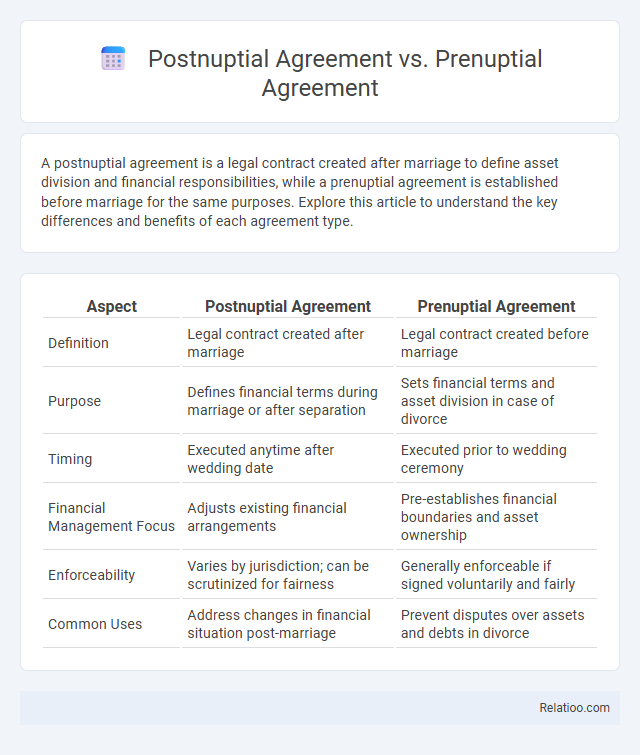A postnuptial agreement is a legal contract created after marriage to define asset division and financial responsibilities, while a prenuptial agreement is established before marriage for the same purposes. Explore this article to understand the key differences and benefits of each agreement type.
Table of Comparison
| Aspect | Postnuptial Agreement | Prenuptial Agreement |
|---|---|---|
| Definition | Legal contract created after marriage | Legal contract created before marriage |
| Purpose | Defines financial terms during marriage or after separation | Sets financial terms and asset division in case of divorce |
| Timing | Executed anytime after wedding date | Executed prior to wedding ceremony |
| Financial Management Focus | Adjusts existing financial arrangements | Pre-establishes financial boundaries and asset ownership |
| Enforceability | Varies by jurisdiction; can be scrutinized for fairness | Generally enforceable if signed voluntarily and fairly |
| Common Uses | Address changes in financial situation post-marriage | Prevent disputes over assets and debts in divorce |
Introduction to Marital Agreements
Marital agreements, including prenuptial and postnuptial agreements, serve to outline the distribution of assets and financial responsibilities between spouses during marriage and in the event of divorce or separation. A prenuptial agreement is established before marriage, defining property rights and spousal support conditions, while a postnuptial agreement is created after marriage for similar purposes, often to address changes in financial situations. Both agreements provide legal clarity and protection, minimizing conflicts and ensuring fair asset division according to individual circumstances and jurisdictional laws.
Defining Prenuptial Agreements
Prenuptial agreements are legal contracts signed before marriage that outline the division of assets, debts, and financial responsibilities in case of divorce or death. They provide clarity and protection for both parties, ensuring that Your financial interests and expectations are clearly defined and agreed upon. Unlike postnuptial agreements made after marriage, prenuptial agreements focus on pre-marital arrangements to prevent future disputes.
Understanding Postnuptial Agreements
Postnuptial agreements are legal contracts created after marriage to outline asset division, debt responsibility, and financial rights in the event of divorce or separation. Unlike prenuptial agreements, which are signed before marriage, postnuptial agreements allow you to address changes in your marriage or financial situation over time. Understanding postnuptial agreements empowers you to protect your interests and clarify responsibilities within your marriage after the wedding has taken place.
Key Differences Between Prenuptial and Postnuptial Agreements
Prenuptial agreements are legal contracts signed before marriage outlining asset division and financial responsibilities, while postnuptial agreements are executed after marriage to address similar issues or changes in circumstances. Prenuptial agreements often serve to protect individual assets and clarify financial rights prior to union, whereas postnuptial agreements may be used to resolve conflicts or update terms as the marriage evolves. Both agreements require full disclosure and legal formalities to be enforceable but differ primarily in timing and purpose related to marital status.
Legal Requirements for Validity
Legal requirements for the validity of postnuptial and prenuptial agreements vary by jurisdiction but commonly include voluntary consent, full financial disclosure, and fairness of terms. Prenuptial agreements must be executed before marriage, often needing notarization or witnesses, while postnuptial agreements are signed after marriage with similar formalities to ensure enforceability. Courts may scrutinize undue influence or coercion in both agreements, emphasizing clear mutual consent and compliance with state-specific statutory mandates.
Common Reasons for Each Type of Agreement
Postnuptial agreements often address financial changes or disputes arising during marriage, protecting assets after significant life events such as inheritance or business ventures. Prenuptial agreements are commonly used to outline asset division and debt responsibility before marriage, offering clarity and protection against future conflicts. You may consider a postnuptial agreement if circumstances change after marriage, while a prenuptial agreement is ideal for setting terms upfront.
Pros and Cons: Prenup vs Postnup
Prenuptial agreements provide clear asset division and debt responsibility before marriage, reducing conflict but may cause tension during wedding planning. Postnuptial agreements offer flexibility to address financial changes during marriage yet may be viewed with suspicion and require more negotiation. Both protect individual interests, but prenups tend to be more enforceable, whereas postnups accommodate evolving circumstances.
Financial Protection and Asset Division
Postnuptial agreements and prenuptial agreements both provide critical financial protection by clearly outlining asset division and financial responsibilities in the event of divorce or separation. Prenuptial agreements are established before marriage, setting terms for your financial security and protecting premarital assets, while postnuptial agreements are executed after marriage to address changes in financial circumstances or asset accumulation. Both agreements serve to minimize disputes by clearly defining how property and debts will be divided, ensuring fair treatment and preserving your financial interests.
Impact on Divorce Proceedings
Postnuptial agreements and prenuptial agreements both significantly influence divorce proceedings by outlining asset division, spousal support, and debt responsibility, but prenuptial agreements are established before marriage, often providing clearer terms due to planning ahead. Postnuptial agreements, created after marriage, can be subject to greater scrutiny regarding fairness and voluntariness, potentially impacting their enforceability in divorce courts. Courts typically evaluate the timing, disclosure, and consent for both agreements to determine the extent of their impact on divorce settlements.
Choosing the Right Agreement for Your Marriage
Choosing the right agreement for your marriage depends on timing and circumstances: a prenuptial agreement is established before marriage to outline asset division and financial responsibilities, while a postnuptial agreement is created after marriage to address changes in financial status or resolve disputes. Both agreements provide legal protection and clarity but differ in enforceability based on jurisdiction and specific terms. Couples should consider factors such as marital goals, asset complexity, and legal advice when deciding between these contracts to ensure the best fit for their unique situation.

Infographic: Postnuptial Agreement vs Prenuptial Agreement
 relatioo.com
relatioo.com